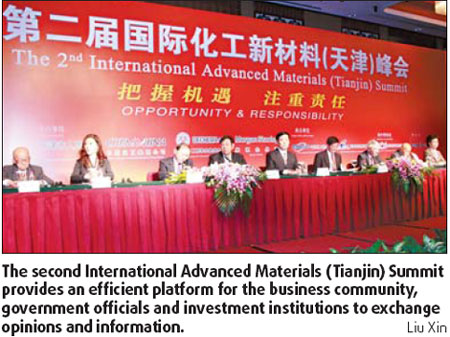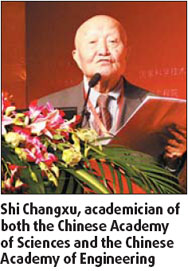|

The second International Advanced Materials Summit, which began in Tianjin yesterday and ends today, has attracted more than 300 participants from home and abroad.
The premium event provides an efficient platform for the business community, government officials and investment institutions to exchange opinions and information, said Yang Dongliang, vice-mayor of the host city.
Three special technological sections regarding autos, aviation and aerospace, and water resources were held in the afternoon, in a bid to explore the forefront of technological advancements.
Chemical materials have a bright future, Shi Changxu, academician of both the Chinese Academy of Sciences and the Chinese Academy of Engineering, said at the meeting yesterday.
Due to a worsening environment and heavy consumption of energy and resources, new eco-friendly materials are requested for a sustainable economy, he said.
In particular, he predicted that carbon fiber reinforced (CFR) composite materials, which are widely used in making planes, will have a brisk growth in China.
Since the earthquake in Sichuan in May, China will invest more in producing helicopters, which will result in a higher demand for CFR composite materials, Shi said.
Advanced materials also play an active role in promoting the use of clean energy, he noted, adding that the key to photovoltaic solar energy technology lies in extracting silicon, a key element for semi-conductor chips.
Development of the west China region should start from development of renewable energy, he said. The region has ample sunshine, vast land and a lower population density, so it is an ideal place to build photovoltaic power stations.
With hydrogen-making through electrolysis of water by use of solar power, China will meet its quota of hydrogen energy, Shi predicted.
Then development of materials for hydrogen storage and transportation will be on the agenda, he said.
Experts in the material industry should get themselves deeply involved in research on renewable energy, Shi proposed.
Confidence needed

As the global financial crisis is spreading wildly worldwide and is endangering other sectors, many of the speakers touched on the topic of how to deal with the challenges that have arisen at the meeting yesterday.
Despite increasing pressure on exports, of which many Chinese companies have experienced the chill, Ren Jianxin, president of the China National Chemical Corporation (ChemChina), is still optimistic about his company's future.
ChemChina registered a 34 percent growth in sales in the first three quarters.
"My confidence (in ChemChina's prospects) lies in my confidence in the nation," he stressed.
Less affected by the financial turmoil, China is quick to make response, he said.
The Chinese government has adopted a series of measures to extend support to industries in need, including the recent announcement of increased export tariff rebates, Ren said.
Moreover, as the most populous country, China has enormous market growth potential, with policies released to spur domestic consumption and new countryside construction, he noted.
As costs of raw materials are plummeting, Ren is eyeing expanding production facilities.
He revealed at the meeting that ChemChina plans to invest in building a technological park in Tianjin and pour in 8 to 10 billion yuan in the initial phase of the project.
Obviously ChemChina's business partner also has the same confidence.
One of the biggest US private funds, Blackstone clinched a deal with ChemChina last September to secure a 20 percent stake in Bluestar, a prime subsidiary of ChemChina.
The payment has been delivered, according to Ren.
Another financial institution, Morgan Stanley, also expressed its confidence in the nation. "We believe that China will become a key contributing factor for the world economy recovery," said Christianson Wei, managing director and CEO of Morgan Stanley China.
As one of the earliest Wall Street firms entering the Chinese market in the early 1990s, Morgan Stanley has reaped a lot from China's booming economy and deepening opening-up.
The revenues the firm gained from China roughly accounted for 10 percent of its global total, which was not imaginable 10 years ago, she said.
Thus China is now valued as a key part in Morgan Stanley's global strategy, she added.
(China Daily 10/31/2008 page15) |

